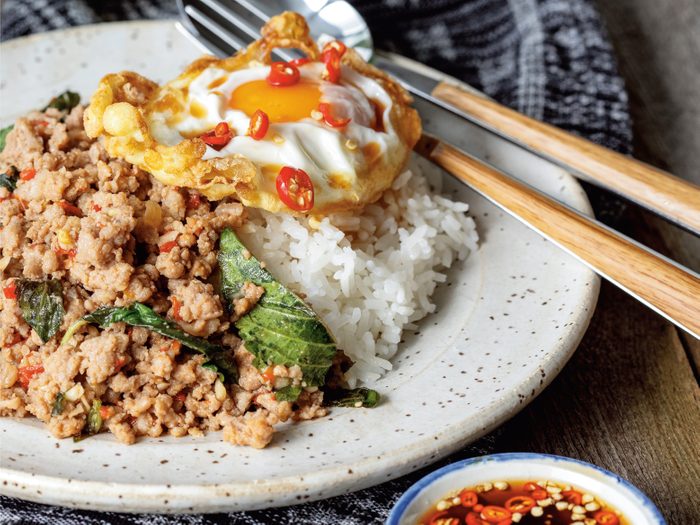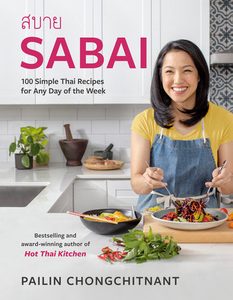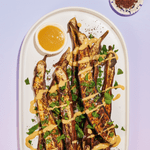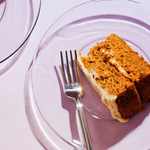A Simple Recipe for Old-School Pad Gaprao

A recipe for pad gaprao, excerpted from the cookbook Sabai by Pailin Chongchitnant
Pad gaprao, sometimes written (incorrectly) as pad kra pao, is a true staple of the Thai diet. It’s sold by street vendors and at fancy restaurants, and made at home all over the country. I call this the “old school” version because it’s the old style that differs from the newer variants that are more popular today. It’s much simpler, seasoned with only fish sauce, and has no vegetables, so the flavor of the basil really shines. Modern variations include soy sauce, oyster sauce, and veggies like onions and long beans. There’s no wrong way to do it, and I want to share this piece of history before it disap- pears—and also because it’s much simpler to make than modern versions, but equally delicious!
Old-School Pad Gaprao
Pad Gaprao Moo Kai Dao | ผัดกะเพราหมูไข่ดาว
Serves 4
Cooking Time: 10 minutes, plus 5 to 10 minutes if frying eggs
Ingredients
- 2 to 3 Thai chilies, or as many as you can handle
- 1/3 cup (40 g) chopped mild red peppers
- 7 cloves (35 g) garlic
- Oil for frying eggs (optional)
- 4 eggs (optional, see note)
- 2 to 3 tablespoons (30 to 45 ml) neutral oil
- 1 pound (450 g) lean ground pork
- 2 tablespoons (30 ml) fish sauce
- 2 teaspoons (10 ml) granulated sugar
- 1½ cups (22 g) holy basil or Italian basil leaves (see note)
- Jasmine rice, for serving
Notes: Pad gaprao is typically paired with a fried egg when served as a one-dish meal. If serving as part of a multi-dish Thai meal, you can omit the egg.
You might be tempted to use Thai basil instead, but Italian basil is actually the better substitute.
Directions
Using a mortar and pestle, pound the Thai chilies until fine, then add the mild red peppers and garlic and pound into a rough paste.
If you’re making fried eggs, make them now. In a small nonstick frying pan, heat about 1/3 inch (8 mm) of oil over medium-high heat. Test the temperature of the oil by adding a little piece of vegetable scrap, like the garlic or pepper, and it should bubble excitedly right away. Once the oil is hot, add 1 egg. The white should bubble up right away. Using a spoon to occasionally baste the top of the egg with oil to help it cook faster, cook for about 1 minute for a runny yolk, or 2 minutes for a set yolk. You want the white crispy and browned, so if it’s not browning, turn up the heat. Remove the egg from the pan and drain on paper towel; repeat with the remaining eggs.
Place a wok on medium heat, then add the oil and garlic-chili paste. Stir for about 2 minutes, until the smallest bits of garlic start to turn golden.
Turn the heat up to high, add the ground pork, then quickly toss to mix with the garlic-chili paste. Add the fish sauce and sugar, and keep tossing and breaking up the pork until it is fully cooked.
Turn off the heat, then add the holy basil and cook just until wilted. Taste and adjust the seasoning with fish sauce and sugar as needed.
Plate and serve with jasmine rice. If serving as a one-dish meal, place the rice on a plate, spoon the pork over it, and top everything with the fried egg.
Tip: I usually say you can make things as spicy as you want, but for the real pad gaprao experience, you should make it as spicy as you can handle! But it’s not just about the heat, as chilies also provide flavor that’s important to this dish. This is why we use mild and hot chilies; the mild ones add the needed chili flavor without making the dish too spicy. Red bell pepper will work, but preferably something smaller and less watery. The seeds and pith can be removed to reduce heat.

Excerpted from Sabai by Pailin Chongchitnant. Copyright © 2023 Pailin Chongchitnant. Photographs by Janis Nicolay. Published by Appetite by Random House®, a division of Penguin Random House Canada Limited. Reproduced by arrangement with the Publisher. All rights reserved.
Next: How to Make Egg Fried Rice (And Use Up Fridge Leftovers)




